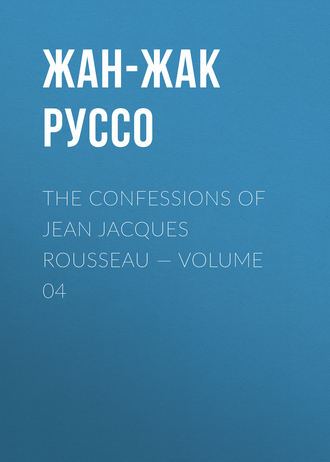
Жан-Жак Руссо
The Confessions of Jean Jacques Rousseau — Volume 04
At Berne, I was not useless to him, nor was my performance so bad as I had feared: I certainly spoke better and with more confidence than I could have done for myself. Matters were not conducted here with the same simplicity as at Fribourg; long and frequent conferences were necessary with the Premiers of the State, and the examination of his titles was not the work of a day; at length, everything being adjusted, he was admitted to an audience by the Senate; I entered with him as interpreter, and was ordered to speak. I expected nothing less, for it never entered my mind, that after such long and frequent conferences with the members, it was necessary to address the assembly collectively, as if nothing had been said. Judge my embarrassment!—a man so bashful to speak, not only in public, but before the whole of the Senate of Berne! to speak impromptu, without a single moment for recollection; it was enough to annihilate me—I was not even intimidated. I described distinctly and clearly the commission of the Archimandrite; extolled the piety of those princes who had contributed, and to heighten that of their excellencies by emulation, added that less could not be expected from their well—known munificence; then, endeavoring to prove that this good work was equally interesting to all Christians, without distinction of sect; and concluded by promising the benediction of Heaven to all those who took part in it. I will not say that my discourse was the cause of our success, but it was certainly well received; and on our quitting the Archimandrite was gratified by a very genteel present, to which some very handsome compliments were added on the understanding of his secretary; these I had the agreeable office of interpreting; but could not take courage to render them literally.
This was the only time in my life that I spoke in public, and before a sovereign; and the only time, perhaps, that I spoke boldly and well. What difference in the disposition of the same person. Three years ago, having been to see my old friend, M. Roguin, at Yverdon, I received a deputation to thank me for some books I had presented to the library of that city; the Swiss are great speakers; these gentlemen, accordingly, made me a long harangue, which I thought myself obliged in honor to answer, but so embarrassed myself in the attempt, that my head became confused, I stopped short, and was laughed at. Though naturally timid, I have sometimes acted with confidence in my youth, but never in my advanced age: the more I have seen of the world the less I have been able to adapt its manners.
On leaving Berne, we went to Soleurre: the Archimandrite designing to re-enter Germany, and return through Hungary or Poland to his own country. This would have been a prodigious tour; but as the contents of his purse rather increased than diminished during his journey, he was in no haste to return. For me, who was almost as much pleased on horseback as on foot, I would have desired no better than to have travelled thus during my whole life; but it was pre-ordained that my journey should soon end.
The first thing we did after our arrival at Soleurre, was to pay our respects to the French ambassador there. Unfortunately for my bishop, this chanced to be the Marquis de Bonac, who had been ambassador at the Porte, and was acquainted with every particular relative to the Holy Sepulchre. The Archimandrite had an audience that lasted about a quarter of an hour, to which I was not admitted, as the ambassador spoke French and Italian at least as well as myself. On my Grecian's retiring, I was prepared to follow him, but was detained: it was now my turn. Having called myself a Parisian, as such, I was under the jurisdiction of his excellency: he therefore asked me who I was? exhorting me to tell the truth; this I promised to do, but entreated a private audience, which was immediately granted. The ambassador took me to his closet, and shut the door; there, throwing myself at his feet, I kept my word, nor should I have said less, had I promised nothing, for a continual wish to unbosom myself, puts my heart perpetually upon my lips. After having disclosed myself without reserve to the musician Lutold, there was no occasion to attempt acting the mysterious with the Marquis de Bonac, who was so well pleased with my little history, and the ingenuousness with which I had related it, that he led me to the ambassadress, and presented me, with an abridgment of my recital. Madam de Bonac received me kindly, saying, I must not be suffered to follow that Greek monk. It was accordingly resolved that I should remain at their hotel till something better could be done for me. I wished to bid adieu to my poor Archimandrite, for whom I had conceived an attachment, but was not permitted; they sent him word that I was to be detained there, and in quarter of an hour after, I saw my little bundle arrive. M. de la Martiniere, secretary of the embassy, had in a manner the care of me; while following him to the chamber appropriated to my use, he said, "This apartment was occupied under the Count de Luc, by a celebrated man of the same name as yourself; it is in your power to succeed him in every respect, and cause it to be said hereafter, Rousseau the First, Rousseau the Second." This similarity which I did not then expect, would have been less flattering to my wishes could I have foreseen at what price I should one day purchase the distinction.
What M. de la Martiniere had said excited my curiosity; I read the works of the person whose chamber I occupied, and on the strength of the compliment that had been paid me (imagining I had a taste for poetry) made my first essay in a cantata in praise of Madam de Bonac. This inclination was not permanent, though from time to time I have composed tolerable verses. I think it is a good exercise to teach elegant turns of expression, and to write well in prose, but could never find attractions enough in French poetry to give entirely in to it.
M. de la Martiniere wished to see my style, and asked me to write the detail I had before made the ambassador; accordingly I wrote him a long letter, which I have since been informed was preserved by M. de Marianne, who had long been attached to the Marquis de Bonac, and has since succeeded M. de Martiniere as secretary to the embassy of M. de Courtellies.
The experience I began to acquire tended to moderate my romantic projects; for example, I did not fall in love with Madam de Bonac, but also felt I did not stand much chance of succeeding in the service of her husband. M. de la Martiniere was already in the only place that could have satisfied my ambition, and M. de Marianne in expectancy: thus my utmost hopes could only aspire to the office of under secretary, which did not infinitely tempt me: this was the reason that when consulted on the situation I should like to be placed in, I expressed a great desire to go to Paris. The ambassador readily gave in to the idea, which at least tended to disembarrass him of me. M. de Mervilleux interpreting secretary to the embassy, said, that his friend, M. Godard, a Swiss colonel, in the service of France, wanted a person to be with his nephew, who had entered very young into the service, and made no doubt that I should suit him. On this idea, so lightly formed, my departure was determined; and I, who saw a long journey to perform with Paris at the end of it, was enraptured with the project. They gave me several letters, a hundred livres to defray the expenses of my journey, accompanied with some good advice, and thus equipped I departed.
I was a fortnight making the journey, which I may reckon among the happiest days of my life. I was young, in perfect health, with plenty of money, and the most brilliant hopes, add to this, I was on foot, and alone. It may appear strange, I should mention the latter circumstance as advantageous, if my peculiarity of temper is not already familiar to the reader. I was continually occupied with a variety of pleasing chimeras, and never did the warmth of my imagination produce more magnificent ones. When offered an empty place in a carriage, or any person accosted me on the road, how vexed was I to see that fortune overthrown, whose edifice, while walking, I had taken such pains to rear.
For once my ideas were all martial: I was going to live with a military man; nay, to become one, for it was concluded I should begin with being a cadet. I already fancied myself in regimentals, with a fine white feather nodding on my hat, and my heart was inflamed by the noble idea. I had some smattering of geometry and fortification; my uncle was an engineer; I was in a manner a soldier by inheritance. My short sight, indeed, presented some little obstacle, but did not by any means discourage me, as I reckoned to supply that defect by coolness and intrepidity. I had read, too, that Marshal Schomberg was remarkably shortsighted, and why might not Marshal Rousseau be the same? My imagination was so warm by these follies, that it presented nothing but troops, ramparts, gabions, batteries, and myself in the midst of fire and smoke, an eyeglass in hand, commanding with the utmost tranquility. Notwithstanding, when the country presented a delightful prospect, when I saw charming groves and rivulets, the pleasing sight made me sigh with regret, and feel, in the midst of all this glory, that my heart was not formed for such havoc; and soon without knowing how, I found my thoughts wandering among my dear sheep-folds, renouncing forever the labor of Mars.
How much did Paris disappoint the idea I had formed of it! The exterior decorations I had seen at Turin, the beauty of the streets, the symmetry and regularity of the houses, contributed to this disappointment, since I concluded that Paris must be infinitely superior. I had figured to myself a splendid city, beautiful as large, of the most commanding aspect, whose streets were ranges of magnificent palaces, composed of marble and gold. On entering the faubourg St. Marceau, I saw nothing but dirty stinking streets, filthy black houses, an air of slovenliness and poverty, beggars, carters, butchers, cries of diet-drink and old hats. This struck me so forcibly, that all I have since seen of real magnificence in Paris could never erase this first impression, which has ever given me a particular disgust to residing in that capital; and I may say, the whole time I remained there afterwards, was employed in seeking resources which might enable me to live at a distance from it. This is the consequence of too lively imagination, which exaggerates even beyond the voice of fame, and ever expects more than is told. I have heard Paris so flatteringly described, that I pictured it like the ancient Babylon, which, perhaps, had I seen, I might have found equally faulty, and unlike that idea the account had conveyed. The same thing happened at the Opera-house, to which I hastened the day after my arrival! I was sensible of the same deficiency at Versailles! and some time after on viewing the sea. I am convinced this would ever be the consequence of a too flattering description of any object; for it is impossible for man, and difficult even for nature herself, to surpass the riches of my imagination.
By the reception I met with from all those to whom my letters were addressed, I thought my fortune was certainly made. The person who received me the least kindly was M. de Surbeck, to whom I had the warmest recommendation. He had retired from the service, and lived philosophically at Bagneux, where I waited on him several times without his offering me even a glass of water. I was better received by Madam de Merveilleux, sister-in-law to the interpreter, and by his nephew, who was an officer in the guards. The mother and son not only received me kindly, but offered me the use of their table, which favor I frequently accepted during my stay at Paris.
Madam de Merveilleux appeared to have been handsome; her hair was of a fine black, which, according to the old mode, she wore curled on the temples. She still retained (what do not perish with a set of features) the beauties of an amiable mind. She appeared satisfied with mine, and did all she could to render me service; but no one seconded her endeavors, and I was presently undeceived in the great interest they had seemed to take in my affairs. I must, however, do the French nation the justice to say, they do not so exhaust themselves with protestations, as some have represented, and that those they make are usually sincere; but they have a manner of appearing interested in your affairs, which is more deceiving than words. The gross compliments of the Swiss can only impose upon fools; the manners of the French are more seducing, and at the same time so simple, that you are persuaded they do not express all they mean to do for you, in order that you may be the more agreeably surprised. I will say more; they are not false in their protestations, being naturally zealous to oblige, humane, benevolent, and even (whatever may be said to the contrary) more sincere than any other nation; but they are too flighty: in effect they feel the sentiments they profess for you, but that sentiment flies off as instantaneously as it was formed. In speaking to you, their whole attention is employed on you alone, when absent you are forgotten. Nothing is permanent in their hearts, all is the work of the moment.
Thus I was greatly flattered, but received little service. Colonel Godard for whose nephew I was recommended, proved to be an avaricious old wretch, who, on seeing my distress (though he was immensely rich), wished to have my services for nothing, meaning to place me with his nephew, rather as a valet without wages than a tutor. He represented that as I was to be continually engaged with him, I should be excused from duty, and might live on my cadet's allowance; that is to say, on the pay of a soldier: hardly would he consent to give me a uniform, thinking the clothing of the army might serve. Madam de Merveilleux, provoked at his proposals, persuaded me not to accept them; her son was of the same opinion; something else was to be thought on, but no situation was procured. Meantime, I began to be necessitated; for the hundred livres with which I had commenced my journey could not last much longer; happily, I received a small remittance from the ambassador, which was very serviceable, nor do I think he would have abandoned me had I possessed more patience; but languishing, waiting, soliciting, are to me impossible: I was disheartened, displeased, and thus all my brilliant expectations came once more to nothing. I had not all this time forgotten my dear Madam de Warrens, but how was I to find her? Where should I seek her? Madam de Merveilleux, who knew my story, assisted me in the search, but for a long time unavailingly; at length, she informed me that Madam de Warrens had set out from Paris about two months before, but it was not known whether for Savoy or Turin, and that some conjectured she was gone to Switzerland. Nothing further was necessary to fix my determination to follow her, certain that wherever she might be, I stood more chance of finding her at those places than I could possibly do at Paris.
Before my departure, I exercised my new poetical talent in an epistle to Colonel Godard, whom I ridiculed to the utmost of my abilities. I showed this scribble to Madam de Merveilleux, who, instead of discouraging me, as she ought to have done, laughed heartily at my sarcasms, as well as her son, who, I believe, did not like M. Godard; indeed, it must be confessed, he was a man not calculated to obtain affection. I was tempted to send him my verses, and they encouraged me in it; accordingly I made them up in a parcel directed to him, and there being no post then at Paris by which I could conveniently send this, I put it in my pocket, and sent it to him from Auxerre, as I passed through that place. I laugh, even yet, sometimes, at the grimaces I fancy he made on reading this panegyric, where he was certainly drawn to the life; it began thus:
Tu croyois, vieux Penard, qu' une folle manie
D' elever ton neveu m'inspireroit l'envie.
This little piece, which, it is true, was but indifferently written; did not want for salt, and announced a turn for satire; it is, notwithstanding, the only satirical writing that ever came from my pen. I have too little hatred in my heart to take advantage of such a talent; but I believe it may be judged from those controversies, in which from time to time I have been engaged in my own defence, that had I been of a vindictive disposition, my adversaries would rarely have had the laughter on their side.
What I most regret, is not having kept a journal of my travels, being conscious that a number of interesting details have slipped my memory; for never did I exist so completely, never live so thoroughly, never was so much myself, if I dare use the expression, as in those journeys made on foot. Walking animates and enlivens my spirits; I can hardly think when in a state of inactivity; my body must be exercised to make my judgmemt active. The view of a fine country, a succession of agreeable prospects, a free air, a good appetite, and the health I gained by walking; the freedom of inns, and the distance from everything that can make me recollect the dependence of my situation, conspire to free my soul, and give boldness to my thoughts, throwing me, in a manner, into the immensity of beings, where I combine, choose and appropriate them to my fancy, without constraint or fear. I dispose of all nature as I please; my heart wandering from object to object, approximates and unites with those that please it, is surrounded by charming images, and becomes intoxicated with delicious sensations. If, attempting to render these permanent, I am amused in describing to myself, what glow of coloring, what energy of expression, do I give them!—It has been said, that all these are to be found in my works, though written in the decline of life. Oh! had those of my early youth been seen, those made during my travels, composed, but never written!—Why did I not write them? will be asked; and why should I have written them? I may answer. Why deprive myself of the actual charm of my enjoyments to inform others what I enjoyed? What to me were readers, the public, or all the world, while I was mounting the empyrean. Besides, did I carry pens, paper and ink with me? Had I recollected all these, not a thought would have occurred worth preserving. I do not foresee when I shall have ideas; they come when they please, and not when I call for them; either they avoid me altogether, or rushing in crowds, overwhelm me with their force and number. Ten volumes a day would not suffice barely to enumerate my thoughts; how then should I find time to write them? In stopping, I thought of nothing but a hearty dinner; on departing, of nothing but a charming walk; I felt that a new paradise awaited me at the door, and eagerly leaped forward to enjoy it.







